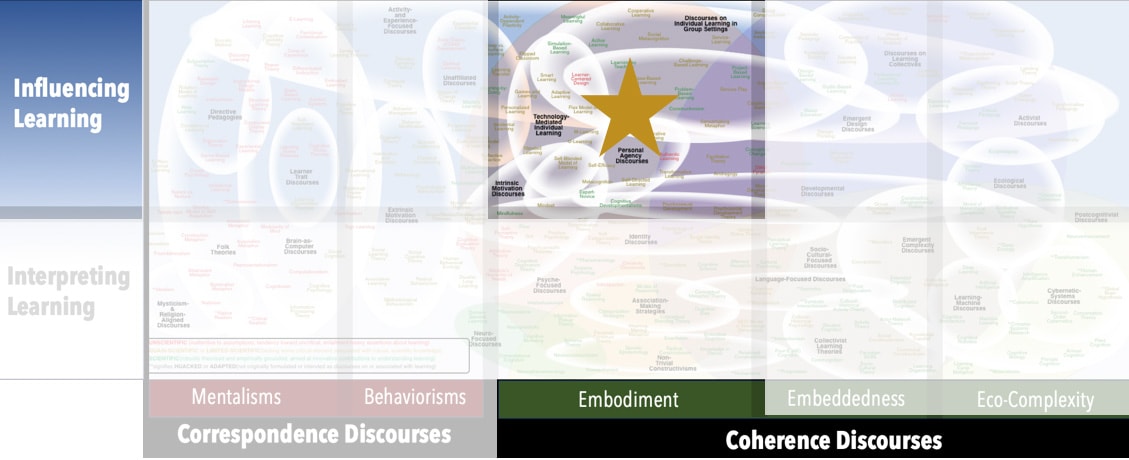AKA
Adult Learning Theory
Anthropagogy
Focus
Distinct qualities of and necessary accommodations for adult learnersPrincipal Metaphors
- Knowledge is … what one has learned
- Knowing is … using what one has learned
- Learner is … an adult (individual)
- Learning is … experiencing and integrating
- Teaching is … facilitating
Originated
1960s (The first recorded use of the word was on the 1830s, but the disciplined pursuit began more than a century later.)Synopsis
Derived from the Greek andr- + agogos, meaning “leading men,” Andragogy is used in contrast to “pedagogy” (meaning “leading children”) to signal a focus on methods and principles that are specific to adult education. Within formal education, Andagogy is most often used in specific reference to a mode of Self-Directed Learning that takes into account: adults’ desires to know the reason for learning something; their broad experiences and knowledge bases; their needs for high levels of autonomy in their learning; their inclination toward immediately relevant and useful subjects; their preference for informal, problem-centered over formal, content-focused engagements; and their tendencies to be more internally than externally motivated. (Note: As indicated above, andro- is Greek for “men,” and so some prefer a less-used term derived from the Greek word for “people”: Anthropagogy.) Prominent subdiscourses include:- Chain of Response Model (COR) (Patricia Cross, 1980s), which present a set of seven factors in the success of an adult learning experience: self-esteem; attitude; preconceptions; circumstances; barriers; situation awareness; previous experience
- Characteristics of Adults as Learners Model (K. Patricia Cross, 1980s), which integrates Andragogy, Experiential Learning, Lifelong Learning, and Developmental Discourses. The model considers two categories of influence, personal characteristics (e.g., developmental stages) and situational characteristics (e.g., part-time vs. full-time learning).
- Continuing Education – a category of Andragogy that focuses on updating or extending one’s established expertise, typically in relationship to one’s career or profession
- Geragogy (Eldergogy; Geragogics) (Martha John, 1980s) – incorporating the Greek gēras “old age,” a subdiscourse of Andragogy that is founded on the conviction a distinct educational theory is needed for elderly adults, taking into consideration both their extensive life experiences and possible age-related perceptual, motor, cognitive, and/or memory issues
- Large-Group Capacitation (Clodimir Santos de Morais, 2000s) – Associated with Andragogy and grounded in Activity Theory, Large-Group Capacitation is based on a distinction between “learning” and “capacitation” – that is, between extending one’s formal knowledge and elaborating one’s capabilities. Large-Group Capacitation, then, is about ensuring that learning leads to the development of meaningful and impactful competencies at both individual and collective levels.
- Seasons of Life Theory (Levinson’s Seasons of Life Theory) (Daniel Levinson, 1970s) – a four-stage model of adult development that proposes several stages focused on personal growth and life transitions. Each stage is associated with distinct tasks and challenges and marked by transitions that encourage individuals to re-evaluate their lives and make significant changes. They include:
- Stage 1: Pre-Adulthood Era
- Stage 2: Early Adulthood Era
- Early Adult Transition (17–22 years) – exploring independence and beginning to establish a personal identity
- Entering the Adult World (22–28 years) – seeking balance between career aspirations and personal commitments
- Age 30 Transition (28–33 years) – adjusting personal and professional goals to better align with one’s values
- Settling Down (33–40 years) – increasing stability and progressing toward long-term goals
- Stage 3: Middle Adulthood Era
- Midlife Transition (40–45 years) – rethinking life and achievements, questioning choices, and making necessary changes
- Entering Middle Adulthood (45–50 years) – refining goals based on their previous reflections
- Age 50 Transition (50–55 years) – assessing the successes and challenges of one’s middle adult years and perhaps adjusting goals and lifestyle
- Culmination of Middle Adulthood (55–60 years) – reaching a mature sense of fulfillment, stability, and satisfaction before transitioning into late adulthood.
- Stage 4: Late Adulthood Era
- Late Adulthood (60+ years): reflecting on their life as a whole, preparing for retirement, and finding fulfillment in accomplishments and relationships
Commentary
The distinctions between Andragogy and pedagogy (and between adults and children, as learners) are often overstated. Some argue that such distinctions are not related to ages of learners or stages of their development, but to individual Learning Styles Theories, Cognitive Styles Theories, and/or the Medical Model of (Dis)Ability.Authors and/or Prominent Influences
Alexander Kapp; Eugen Rosenstock-Huessy; Malcolm KnowlesStatus as a Theory of Learning
Andragogy is not a theory of learning.Status as a Theory of Teaching
Andragogy is a theory of teaching.Status as a Scientific Theory
The specific teaching emphases and practices of Andragogy are well supported by evidence. However, there is very little research around its core premise that the needs and preferences of adult learners are distinct. Owing to that lack of research, it is not clear that Andragogy can described as a scientific theory of teaching adults.Subdiscourses:
- Chain of Response Model (COR)
- Characteristics of Adults as Learners Model
- Continuing Education
- Geragogy (Eldergogy; Geragogics)
- Large-Group Capacitation
- Seasons of Life Theory (Levinson’s Seasons of Life Theory)
Map Location

Please cite this article as:
Davis, B., & Francis, K. (2024). “Andragogy” in Discourses on Learning in Education. https://learningdiscourses.com.
⇦ Back to Map
⇦ Back to List
